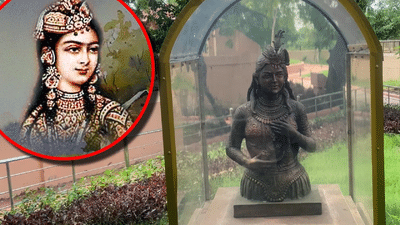Mughal Emperor Akbar, known for his tolerance toward all religions, had nearly 300 wives, though only 36 enjoyed royal privileges. Among the well-known ones were Ruqaiya Sultan Begum, Salima Sultan Begum, and Jodha Bai (Mariam-uz-Zamani).
However, one of Akbar’s lesser-known wives, Taj Begum (also called Taj Bibi), took an entirely different spiritual path. Though born a Muslim, she became a deep devotee of Lord Krishna, so much so that she distanced herself from the Quran and daily prayers and instead immersed herself in Krishna’s bhajans and devotion.
Who Was Taj Begum?Taj Begum was a 17th-century Mughal queen and the daughter of Padna Khan, the fort commander of Mahavan. Her connection to Lord Krishna began early in life, and over time, her devotion only deepened.
During one of Emperor Akbar’s visits to Govardhan, she met Shri Vitthalnath, the son of the famous Vaishnav saint Vallabhacharya. This meeting changed her life completely — Shri Vitthalnath inspired in her a powerful sense of Krishna Prem (love for Krishna).
Soon after, Taj Begum left behind the royal comforts of the Mughal court and settled in Vrindavan and Gokul, dedicating her life to Krishna’s worship.
From Mughal Queen to Krishna BhaktIn Vrindavan, Taj Begum lived like a saint rather than a queen. She sang bhajans, composed devotional poetry, and completely renounced worldly luxuries. Her Krishna-bhakti became so strong that she was often seen singing about Radha-Krishna Leelas.
Although her devotion brought her criticism within the Muslim community, she remained unshaken in her faith. She used to say that Krishna was her true master and expressed pride in being both Turkani (by birth) and Hindustani (by heart).
A famous verse inscribed near her tomb reads:
“Hoon to Turkani, par Hinduaani hvai rahungi main”
(“Though I am a Turk by birth, I shall always remain a Hindustani.”)
After Akbar’s death, Taj Begum completely devoted herself to spiritual life under the guidance of Goswami Vitthalnath. She composed and sang several Krishna bhajans that are still known among Vaishnav devotees.
Her samadhi (tomb) stands near the Raman Reti Ashram in Gokul, Vrindavan, a quiet tribute to a woman who chose divine love over royal luxury.
You may also like

'Future of Gen Z is being destroyed': Rahul Gandhi accuses EC, BJP of 25 lakh voter theft in Haryana - key points

Best Automatic Cars in India 2025 – Smooth Driving with Style and Mileage

A brand revolution: Women cricketers to lead India's next big endorsement wave

Saudi Arabia: Viral video of security officer at Grand Mosque sparks public outcry and official action

EPFO Partners with India Post Payments Bank to Let Pensioners Generate Life Certificates from Home







